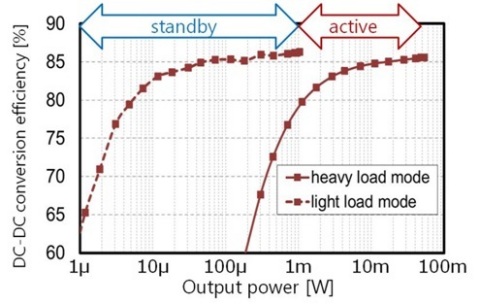TOKYO — (BUSINESS WIRE) — November 8, 2016 — Toshiba Corporation (TOKYO:6502) today announced development of an on-chip Single-Inductor Multiple-Output (SIMO) DC-DC converter for IoT devices reliant on coin-type lithium-ion batteries for power. The new converter achieves 65%-to-86% efficiency in the load range from 1 μW to 50 mW, more than 100 times wider than that of a conventional SIMO DC-DC converter, and extends the battery life of IoT devices. The advance was announced at the IEEE Asian Solid-State Circuits Conference (A-SSCC) 2016 in Toyama, Japan, on November 9.
This Smart News Release features multimedia. View the full release here: http://www.businesswire.com/news/home/20161108006360/en/

Fig. 1: DC-DC conversion efficiency vs. output power (Graphic: Business Wire)
ICs that rely on small capacity coin-type lithium-ion batteries for power supply are increasingly used in a wide variety of IoT applications, and are required to save power by operating at minimum supply voltages in each circuit. In order to supply multiple voltages, multiple external inductors were required in a conventional DC-DC converter, but a SIMO DC-DC converter needs only one external inductor. This advantage in reducing device cost and volume has stimulated widespread R&D of SIMO DC-DC converters.
Since an IoT device spends most of its life in standby mode (where power consumption is below 1 mW) and a small part of it in active mode (where power consumption is in the tens of mW), a SIMO DC-DC converters must support a wide load range with high conversion efficiency. However, conventional SIMO DC-DC converters were not designed for IoT applications, and have not been able to support such a wide load range with practical efficiency.
Toshiba has improved SIMO DC-DC converter efficiency in the light load range. The highly sensitive comparator of the conventional control circuit is replaced with a new control circuit that consists of only logic gates1, reducing its power consumption. In addition, the switching frequency of switches that distribute current to output channels is reduced by a newly proposed operation mode. As a result, Toshiba’s new SIMO DC-DC converter achieves over 80% efficiency when the load power is above 5 μW and about 65% when the load power is 1 μW.
Toshiba has also improved efficiency in the tens of mW load range. Conventional analog control required a relatively long wait time before channel switching to prevent interference between output channels of a SIMO DC-DC converter, degrading efficiency in this load range. The new SIMO DC-DC converter uses digital feedback control to minimize waiting time.
The above architecture supports Toshiba’s SIMO DC-DC converter in achieving practical efficiency of 65%-to-86%, in the wide load range from 1 μW to 50 mW (Fig. 1). The load range in which the conversion efficiency exceeds 60% is more than 100 times wider than that of conventional SIMO DC-DC converters, and the new SIMO DC-DC converter extends the battery life of IoT devices that are driven by coin-type lithium-ion batteries.
Toshiba plans to use the SIMO DC-DC converter in low-power ICs for IoT devices, including Bluetooth® low energy, in the future.
1 A circuit that performs a logical operation.
*The
Bluetooth® word mark and logos are registered trademarks owned by the
Bluetooth SIG, Inc.
About Toshiba Corporation
Toshiba Corporation, a Fortune Global 500 company, channels world-class
capabilities in advanced electronic and electrical product and systems
into three focus business fields: Energy that sustains everyday
life, that is cleaner and safer; Infrastructure that sustains
quality of life; and Storage that sustains the advanced
information society. Guided by the principles of The Basic Commitment of
the Toshiba Group, “Committed to People, Committed to the Future”,
Toshiba promotes global operations and is contributing to the
realization of a world where generations to come can live better lives.
Founded
in Tokyo in 1875, today’s Toshiba is at the heart of a global network of
550 consolidated companies employing 188,000 people worldwide, with
annual sales surpassing 5.6 trillion yen (US$50 billion). (As of March
31, 2016.)
To find out more about Toshiba, visit
www.toshiba.co.jp/index.htm
View source version on businesswire.com: http://www.businesswire.com/news/home/20161108006360/en/
Contact:
Toshiba Corporation
Storage & Electronic Devices Solutions Company
Koichi
Tanaka / Kota Yamaji, +81-3-3457-3576
Public Relations & Investor
Relations Group
Business Planning Division
Email Contact








